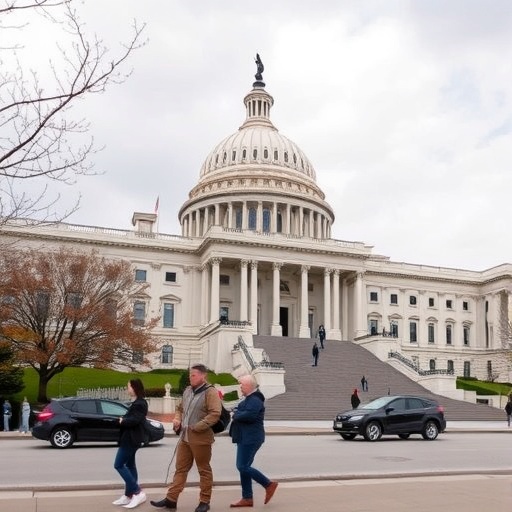Bipartisan Health Care Bills Stalled in Congress as Government Shutdown Derails Preventive Care Progress
In a stark reminder of how political gridlock can jeopardize public health, two bipartisan health care bills aimed at bolstering preventive care are languishing in Congress amid the escalating government shutdown. Democratic Representative Diana DeGette of Colorado and Republican Representative Morgan Griffith of Virginia took center stage at a Washington D.C. event on Thursday, passionately advocating for the Preventive Health Savings Act and a suite of cancer prevention measures. Yet, despite widespread support across the aisle, these pieces of Health care legislation face an uncertain future as the shutdown freezes federal operations and reignites partisan battles over health insurance subsidies.
- Bipartisan Health Care Bills Stalled in Congress as Government Shutdown Derails Preventive Care Progress
- DeGette and Griffith Unite on Preventive Health Savings Act
- Cancer Prevention Bills Trapped in Shutdown Limbo
- Partisan Disputes Over Subsidies Fuel Broader Health Care Gridlock
- Advocacy Groups Rally for Breakthrough Amid Shutdown Turmoil
- Path Forward: Negotiations and Potential Wins for Preventive Care
The event, hosted by a coalition of health advocacy groups, highlighted the urgency of these bipartisan bills at a time when millions of Americans are grappling with rising health care costs. DeGette, a longtime champion of health policy, emphasized that preventive care could save the nation billions while improving outcomes for patients. “We’re on the brink of transformative Health care legislation that transcends party lines,” she stated, her voice echoing the frustration felt by many in the medical community. Griffith, nodding in agreement, added, “This isn’t about red or blue; it’s about keeping people healthy before they get sick.”
The government shutdown, now in its third week, has compounded the challenges. With non-essential congressional staff furloughed and committee hearings postponed, the legislative machinery that could propel these bills forward has ground to a halt. This impasse comes at a critical juncture, as data from the Centers for Disease Control and Prevention (CDC) reveals that preventive services prevent up to 100,000 deaths annually from conditions like heart disease and cancer. The shutdown’s ripple effects extend beyond Capitol Hill, delaying research funding and public health initiatives that these bills seek to enhance.
DeGette and Griffith Unite on Preventive Health Savings Act
At the heart of Thursday’s discussion was the Preventive Health Savings Act, a bipartisan bill co-sponsored by DeGette and Griffith that proposes expanding access to screenings, vaccinations, and wellness programs. This Health care legislation targets the root causes of chronic diseases, aiming to shift the U.S. health system from reactive treatment to proactive prevention. According to a 2023 report by the Trust for America’s Health, investing in preventive care could reduce national health expenditures by 25% over the next decade, freeing up resources for other priorities.
DeGette, who has served in Congress since 1997 and chairs the House Oversight and Reform Committee’s Health Subcommittee, drew from personal experience to underscore the bill’s importance. “As a former nurse, I’ve seen firsthand how early intervention changes lives,” she shared during the event. The act would allocate $500 million annually to community health centers, focusing on underserved rural and urban areas where access to preventive care is limited. Griffith, a pharmacist by training and a member of the House Energy and Commerce Committee, highlighted the economic angle: “By preventing illnesses, we’re not just saving lives; we’re saving taxpayer dollars that would otherwise go to expensive emergency care.”
The bill’s bipartisan support is evident in its roster of 150 co-sponsors from both parties, a rarity in today’s polarized Congress. Yet, progress has been stymied. Introduced in the previous session, it passed the House in a voice vote but stalled in the Senate due to procedural delays. The current government shutdown exacerbates this, as key negotiations require active committee involvement that’s now paused. Advocates worry that the momentum built over months of hearings and amendments could dissipate if the shutdown persists.
To illustrate the stakes, consider the statistics: The CDC estimates that only 8% of U.S. health care spending goes toward prevention, compared to 75% on treating chronic conditions. The Preventive Health Savings Act seeks to rebalance this by incentivizing insurers to cover preventive services without copays, building on the Affordable Care Act’s foundations. During the D.C. event, panelists including representatives from the American Cancer Society praised the bill’s potential to integrate mental health screenings into routine check-ups, addressing a gap that affects 20% of adults annually.
Cancer Prevention Bills Trapped in Shutdown Limbo
Complementing the Preventive Health Savings Act are a series of cancer prevention bills that DeGette and Griffith have championed, including measures to fund early detection research and expand tobacco cessation programs. These bipartisan bills represent a targeted assault on one of America’s deadliest diseases, with cancer claiming over 600,000 lives each year according to the National Cancer Institute. At Thursday’s event, Griffith recounted a poignant story from his Virginia district: “A constituent of mine, a young mother, could have been saved with earlier screening. We can’t let bureaucracy stand in the way.”
One standout proposal is the Cancer Prevention and Early Detection Act, which would authorize $1.2 billion over five years for grants to states implementing comprehensive screening protocols. DeGette noted that disparities in cancer outcomes are stark, with Black Americans 20% more likely to die from the disease than white counterparts due to unequal access to preventive care. The bill addresses this by prioritizing funding for high-risk populations and integrating AI-driven diagnostics to catch cancers at stage zero.
The government shutdown has hit these initiatives hard. The National Institutes of Health (NIH), a primary funder of cancer research, has halted new grants and furloughed 12,000 employees, stalling clinical trials that rely on federal support. “This shutdown isn’t just closing doors on Capitol Hill; it’s closing doors on hope for patients waiting for breakthroughs,” DeGette warned. Bipartisan frustration is mounting, with Senate Majority Leader Chuck Schumer and Minority Leader Mitch McConnell both voicing concerns over the shutdown’s impact on health priorities, though no resolution is in sight.
Historical context adds depth to the gridlock. Similar bipartisan efforts, like the 2018 SUPPORT Act for opioid prevention, succeeded despite shutdown threats, but today’s environment is more fractious. Partisan disputes over health insurance subsidies—particularly extensions for ACA marketplaces—have poisoned the well. Republicans argue for subsidy reforms to curb costs, while Democrats push for expansions, creating a deadlock that bleeds into unrelated health care legislation.
Partisan Disputes Over Subsidies Fuel Broader Health Care Gridlock
The ongoing government shutdown, triggered by disagreements over border funding, has inadvertently torpedoed bipartisan bills in health care legislation. At its core, the impasse revolves around health insurance subsidies, with conservatives demanding cuts to what they call “wasteful spending” and progressives advocating for broader coverage. This clash has delayed floor votes on preventive care measures, as lawmakers leverage the crisis for concessions.
Griffith addressed this directly at the event: “We have common ground on prevention, but the shutdown is forcing us into corners we don’t want to be in.” Data from the Kaiser Family Foundation shows that subsidies have helped 10 million low-income Americans afford insurance, reducing uninsured rates to historic lows. However, with the shutdown costing the economy $1.5 billion daily per the Congressional Budget Office, pressure is building for a compromise—yet none has materialized.
Expert voices amplify the urgency. Dr. Elena Ramirez, president of the Preventive Medicine Association, attended the D.C. gathering and stated, “Every day of delay means missed screenings for thousands. Congress must prioritize health over politics.” Public opinion polls from Gallup indicate 65% of Americans support increased funding for preventive care, transcending party lines and underscoring the bills’ broad appeal.
The shutdown’s toll extends to federal agencies like the Food and Drug Administration (FDA), which has paused routine inspections of medical devices crucial for preventive diagnostics. This has ripple effects on the bipartisan bills, as promised FDA endorsements for new screening technologies are on hold. In rural areas like Griffith’s Virginia district, where cancer rates are 15% higher than urban averages, the delay feels personal. Community health workers report canceled vaccination drives, heightening outbreak risks for preventable diseases like HPV-related cancers.
Advocacy Groups Rally for Breakthrough Amid Shutdown Turmoil
Health advocacy organizations are not standing idle as these bipartisan bills falter. The American Heart Association and Susan G. Komen Foundation co-hosted Thursday’s event, mobilizing over 200 attendees including patients, researchers, and policymakers. Their message was clear: The government shutdown cannot be an excuse to abandon preventive care. “These bills have the power to save 50,000 lives a year through early intervention,” said Komen CEO Paula Schneider in a prepared statement.
Grassroots efforts are intensifying. In Colorado, DeGette’s home state, local chapters of the American Lung Association have launched petition drives urging senators to fast-track the cancer prevention bills upon shutdown resolution. Similarly, Griffith’s Virginia constituents are organizing town halls to highlight how preventive care gaps contribute to the state’s $10 billion annual health burden. These actions aim to build public pressure, a tactic that worked for the 2022 bipartisan mental health parity law.
Looking at international benchmarks, countries like the UK and Canada invest twice as much in preventive care relative to GDP, yielding lower chronic disease rates. U.S. lawmakers could learn from this, but the shutdown has sidelined comparative studies that might inform amendments to the bills. Economists at the Brookings Institution estimate that passing the Preventive Health Savings Act could generate 200,000 jobs in the health sector over the next five years, providing a bipartisan win in an election year.
Path Forward: Negotiations and Potential Wins for Preventive Care
As the government shutdown drags on, glimmers of hope emerge for these stalled bipartisan bills. House Speaker Nancy Pelosi has signaled willingness to bundle health care priorities into a shutdown-ending package, potentially including provisions from the Preventive Health Savings Act. Senate negotiations, though fraught, could see cancer prevention funding attached to must-pass appropriations bills come January.
DeGette remains optimistic: “Bipartisanship on health isn’t dead; it’s just waiting for the lights to come back on in Congress.” Griffith echoed this, calling for a “truce on subsidies” to unlock progress. Watchdogs like the Bipartisan Policy Center predict that post-shutdown, a surge in legislative activity could propel these bills to the president’s desk by spring, especially with midterm elections looming.
The implications are profound. If enacted, this health care legislation could redefine preventive care access, reducing disparities and curbing the $4.1 trillion annual cost of U.S. health care. For patients like those sharing stories at the D.C. event—a breast cancer survivor crediting early screening for her life, or a diabetic veteran praising vaccination programs—these bills aren’t abstract policy; they’re lifelines. As Congress grapples with resolution, the nation watches, hoping common-sense prevention triumphs over partisan deadlock.








